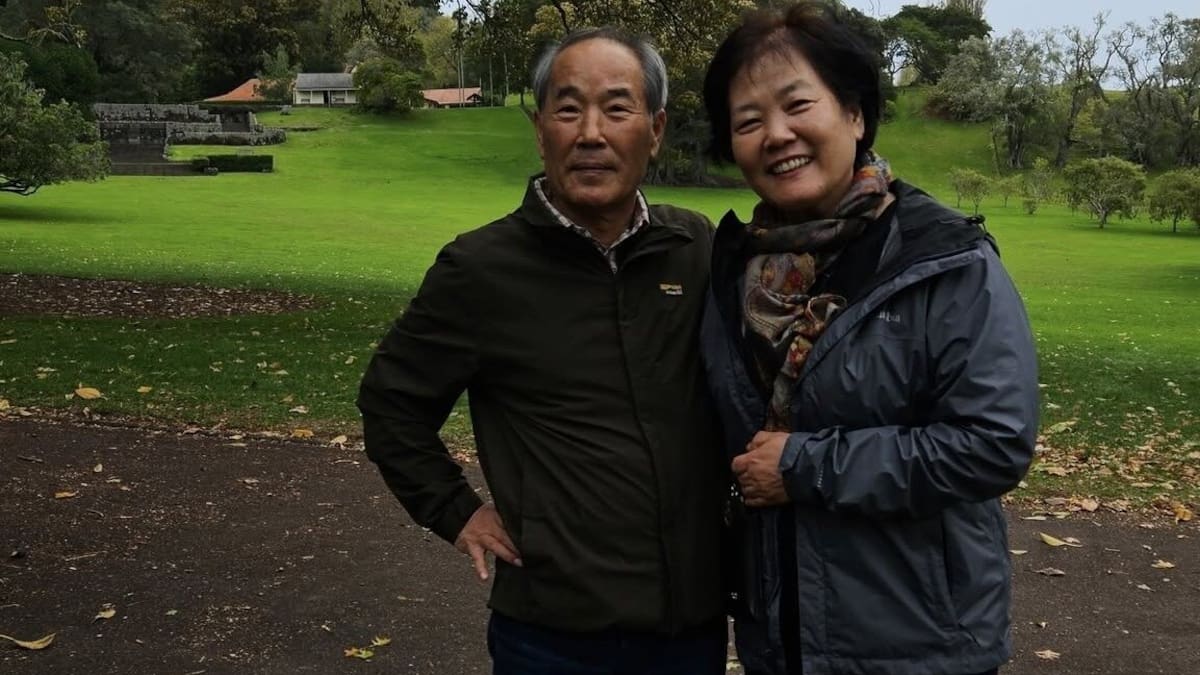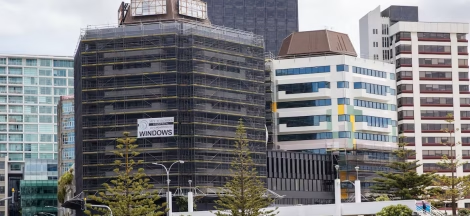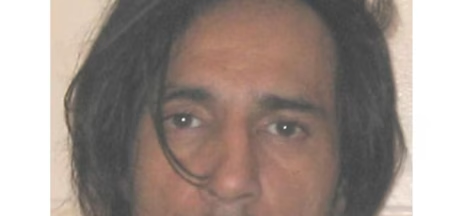One of his final acts in New Zealand this week was to stand before a judge in Auckland District Court, accompanied by an interpreter and members of the Korean consulate as he accepted responsibility for the fatal crash.
He had scrambled since a hearing the day before to wire $10,000 to New Zealand to be submitted to the court as an emotional harm reparation payment to the still-hospitalised surviving victim, who is unlikely to return to university and work in the near future because of her extensive injuries.
In a letter to the court, Kim said his guilt was indescribable.

“That driving was not you exercising the degree of care and attention that a reasonable and prudent driver would exercise in the circumstances,” Judge Grant Fraser later said. “The result is an absolute tragedy and so very, very sad.
“The loss of your beloved wife and the serious injury to the [surviving] victim is catastrophic.”
But the judge also wanted to convey compassion for the mourning widower.
“I want to record that you are a good man and this offending does not define you,” he said as he wished him well on his journey home.
Kim bowed silently, wiping away tears.
High-speed, head-on
Kim had been driving westbound along Waiapa Rd outside Mangakino, in the Waikato District, when court documents state he drifted to the left while trying to negotiate “an easy right-hand bend” and drifted into the grass verge. He then overcorrected as he pulled back onto the asphalt, crossing the centre line.
“The defendant’s vehicle crossed directly into the path of the [other driver’s] Toyota, resulting in a high-speed head-on crash,” state the agreed summary of facts, obtained by the Herald this week.
“Both vehicles sustained extensive damage and came to rest near the point of impact.”
The road had been wet because of showers throughout the day, but weather wasn’t considered a factor in the crash.
Lee died at the scene.
Kim pleaded guilty to two counts of careless or inconsiderate vehicle operation – one causing injury and the other causing death. Both charges carry maximum sentences of three months’ imprisonment and a $4500 fine.
In his letter to the court, translated from Korean, Kim said the car seemed to be having an issue with a sensor. He said he tried to contact the rental company but did not get a response. He now deeply regrets not listening to his wife when she encouraged him to exchange the vehicle, he told the court.
Lee had been sitting directly behind her husband in the rear passenger seat, wearing a seatbelt but with the shoulder restraint improperly pushed down under her arm. She was trying to get further away from the nuisance noise that the sensor was making, the court was told by Kim’s lawyer.

“While maintaining a safe distance from the car in front and driving normally, the vehicle I was driving suddenly slipped [off the road],” Kim said in his letter to the court. “Before I could react or make any manoeuvre, the collision occurred.”
Police, however, had a somewhat different take.
Kim had initially hoped for an immediate sentencing after pleading guilty before a community magistrate in Hamilton District Court. But the sentencing was delayed by a week and transferred to Auckland, where Kim was staying in a hotel, after police asked for more time to investigate before signing off on the agreed facts.
Police then sent out a public appeal for witnesses, noting in a press release that someone had called to report Kim’s RAV4 cutting corners and crossing the centre line shortly before the crash occurred.
“Their phone number appears to be a ‘roaming number’, which does not connect when called back,” Taupō serious crash unit Sergeant Shane McNally said of the unidentified witness.
Disconcerting driving
Police prosecutor Victor Wagner pointed out during this week’s sentencing that there had been two witness reports of erratic driving by Kim’s RAV4 – the other one having been called in days before the crash. He had also been pulled over for speeding earlier in the trip.
The concerned witnesses described the vehicle following too closely, travelling at erratic speeds, weaving within its lane and crossing the fog line to the shoulder of the road.
“Police have ruled out that there was a fault with the vehicle,” Wagner said, suggesting the sensor noise might have been the car warning Kim he was veering from his lane.
Defence lawyer Joon Yi emphasised his client was extremely remorseful and accepted responsibility regardless of whether there was an issue with the car. Had Kim been more insistent on blaming the car for the crash, the case would have likely lingered for months without resolution.
“He’s still not sure how exactly it happened, but he accepts that he should have been more careful knowing there was something possibly wrong with the vehicle,” Yi said.
“This is a tragedy,” he added. “His wife’s favourite place has now turned into something much different for Mr Kim and his family.”
‘Looking from heaven’
The driver of the other vehicle suffered a concussion, a shattered knee, a broken nose needing surgery to reset, a dislocated left shoulder and a broken right shoulder, chipped teeth that are likely to be misaligned, cracked ribs and facial scars, as well as fractured vertebrae, tailbone and sternum.
“The long-term effects of her injuries, which are quite significant, is unknown at this stage,” the prosecutor said.
She was not in court – still bed-bound and likely to remain in hospital for weeks. But the judge referred extensively to her written victim impact statement.

She had been completing her final year towards a bachelor’s degree in counselling and had placements at an intermediate and secondary school she would now have to give up, the court was told. She would most likely have to move in with her mother because her flat has stairs that would make it inaccessible, she said.
Having been involved in a fatal accident, she told the judge, “is an experience I still need to process”.
She ended her statement with grace towards the person responsible for her injuries.
“I would like to acknowledge the pain and suffering of Mr Kim and offer my condolences for his loss,” she said.
Kim’s two daughters, including a physician who had flown from Korea to support him, also wrote letters to the court describing their tight-knit family and how the crash is now “the greatest pain our family has ever known”.
“Under the care of a steadfast father who always looked after us with meticulous attention and a devoted mother full of kindness, my siblings and I grew up as happy adults – feeling their love completely and lacking nothing,” one daughter wrote.
It was as if the world collapsed on April 21, she said, adding that the person suffering the most was her father.
“My mother, who cared for the family so deeply, is looking from heaven hoping we will not continue to suffer from this tragedy,” she said.
‘Great, great country’
By all accounts, Kim and his wife had a special affinity with New Zealand before last month’s tragedy.
On Christmas Day in 2022, Kim posted photos of Hobbiton, noting that his wife and daughter had visited a month prior but he had to miss it because of a business trip. Then last April, he arrived on his own for a solo holiday, gushing about the beautiful scenery as he posted photos of South Island tourist hotspots.

“New Zealand is great, great, great country,” he said with a giant grin as he filmed a tandem paraglide over Queenstown.
He returned with his wife exactly one year after the solo trip.
“My dear wife, thank you for being with me for so long,” he wrote in Korean in another post from One Tree Hill. “I can never express how grateful I am.”
He posted again just after midnight on April 21, giving an effusive review of the Hobbiton set less than 24 hours before the fatal crash.
“It was like a fairy tale and it seemed like the hobbits still live there,” he wrote. “…I’d like to recommend my friends to visit.”
His daughter recalled the smiles on her parents’ faces as she dropped them off at the airport for their New Zealand holiday.
“You shared beautiful photos every day, enjoying your journey to the fullest,” Judge Fraser noted, referring to the daughter’s letter.
Similar cases for careless driving would normally include a sentence of roughly 200 to 300 hours of community work, but Judge Fraser recognised the unique circumstances for Kim. He increased the reparation amount to account for not ordering community work.
“I agree that you should be allowed to travel home as soon as possible, where you can enjoy the continuing support of your family,” the judge said, ordering him to be disqualified from driving for 18 months.
Members of the Korean consulate would drop Kim off at Auckland International Airport the next day, his lawyer said, so the widower could start his post-retirement homecoming to Korea under vastly different circumstances than he had expected.
His wife’s remains would travel home with him.
Craig Kapitan is an Auckland-based journalist covering courts and justice. He joined the Herald in 2021 and has reported on courts since 2002 in three newsrooms in the US and New Zealand.
Sign up to The Daily H, a free newsletter curated by our editors and delivered straight to your inbox every weekday.
Source link





 Napier wedding venue teams up with Bareknuckle BBQ for new hospitality venture
Napier wedding venue teams up with Bareknuckle BBQ for new hospitality venture